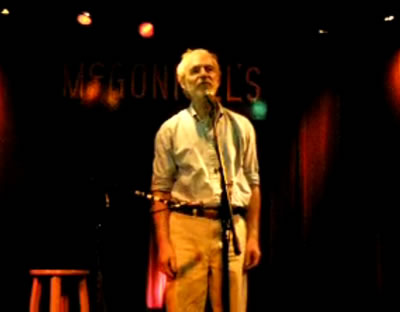
LOVE FILLING STATION • Jesse Winchester
Too many songs fall into one of two categories: underwritten or overwritten. Underwritten songs drip from the pens of tunesmiths who think that merely stating a strong feeling over minimal music is enough if the performance is "heartfelt" enough. These writers believe that only the most direct approach, no matter how clichéd or simplistic, is "honest." Overwritten songs come from those who take pride in cleverness, wordplay, and craftsmanship, often finding approbation among audiences who congratulate themselves on recognizing said attributes. Unfortunately, any real passion is too often lost along the way.
Then there are "great" songs. Great songs sound fresh even when they trade in time-tested emotions, harmonies, and melodies. But whether simple or complex, it appears as if they sprang unbidden from the creative mind of the writer. The operative words are "appears as if." They may in fact be as carefully tooled as the work of any precious "singer/songwriter" -- they just don't sound that way. As Spencer Tracy said about the secret to great acting, "Don't ever let 'em catch you at it." A great song might make you marvel at a well-turned phrase, but it is because you are affected by it -- not because it screamed for you to notice it.
If any of the above is unclear, just listen to Love Filling Station, or for that matter, any Jesse Winchester record, to hear what a great song should be. For almost forty years, Winchester has been writing songs deemed cover-worthy by, among others, Wynonna Judd, Buddy Miller, Jimmy Buffett, Waylon Jennings, Emmy Lou Harris, Delbert McClinton, Amy Grant, The Mavericks, Elvis Costello, and Reba McEntire. Most of these names have written a few top-notch songs in their own right -- they recognize great when they hear it.
Winchester's music is derived from the primal well of blues, gospel, and country. To this brew he adds an ability to weave stories describing particulars of time and place; like a great novel, the songs find universal truths in the specific details. Growing up in Memphis, Tennessee, he spent some draft exile time in Canada -- adding an outsider's objectivity to his personal experience. Like that other outsider who wrote about the American South, Canadian Robbie Robertson of the Band, Winchester has a keen ear for the timeless sounds and rhythms of the land below the Mason-Dixon line.
Love Filling Station comes a decade after his last studio record, the flawless Gentleman of Leisure, and has a slightly more intimate feel -- perhaps due to the slew of solo shows that he performed in the interim.
This record is rife with tales of strong women and unworthy men, from "Bless Your Foolish Heart" ("You may be too good for me, but you can't be too smart / Not if you love me, girl bless your foolish heart") to "It's A Shame About Him" -- a tale of upright wives and lowdown husbands. If not as perfect as Gentleman of Leisure -- I confess a slight preference for Gentlemen's production -- Love Filling Station certainly continues that record's tradition of no filler. Even the covers, like Ben E. King's "Stand By Me," come up to the standards of Winchester's songwriting, matching the record's mood of love desired, troubled but strong, even unto death ("Far Side of Jordan").
I saw Jesse Winchester do a two-hour solo show containing close to thirty songs (they are short and he doesn't say much). There wasn't a weak one in the bunch. He may work hard at crafting these gems, but you will never catch him at it.
• Michael Ross

listen to clips return to covers
jessewinchester.com see our interview with Jesse